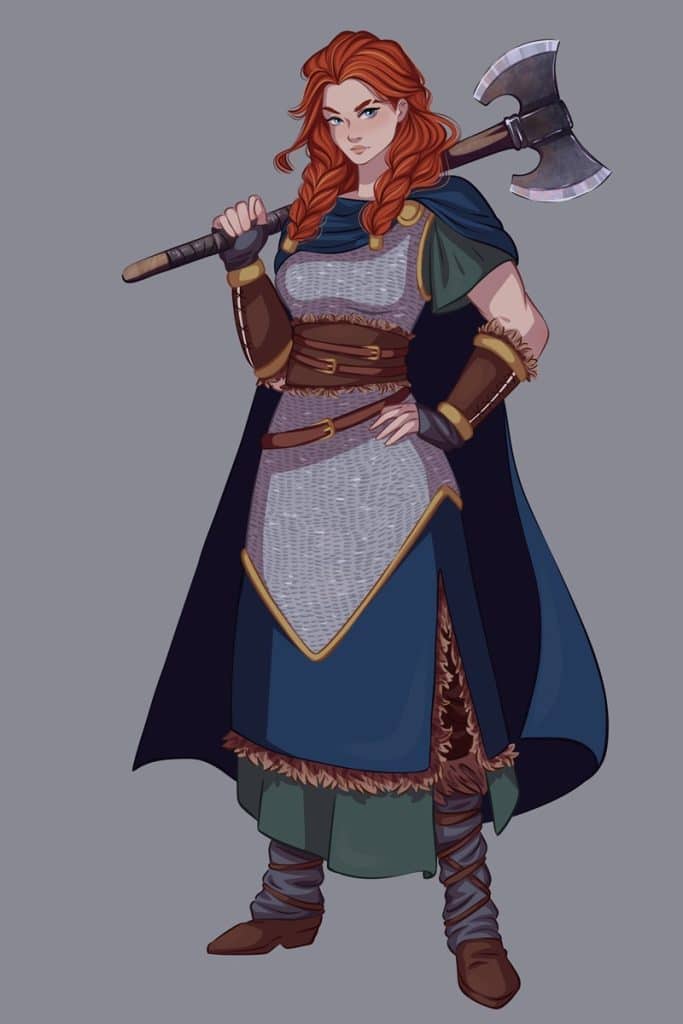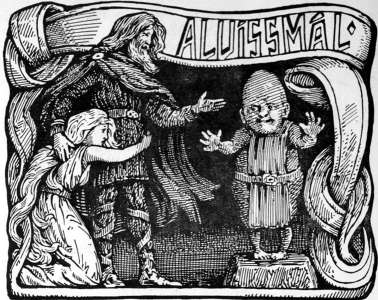Thrud is the Aesir goddess of battle, or possibly a Valkyrie and thus naturally associated with battle. She is the daughter of Thor and Sif, which I feel would go far in explaining her draw towards battle.
However, Thrud is a little mysterious as not that much is known about her today. Still, there are several indications that she was well-known in the Viking Age. Being an independant warrior spirit, she is among my favorite Norse goddesses.
Short Facts
| Parents | Thor and Sif |
| Partners | None known |
| Siblings | Ullr, Modi and Magni |
| Offspring | None known |
| Tribe | Aesir |
| Old Norse Name | Þrúðr |
| Other Names | None known |
| The Goddess of | Strength, Battle |
Name and Etymology
The name Thrud, in Old Norse as “Þrúðr”, translates to “strength” or “power.” Given her lineage as the daughter of Thor, the god of thunder, this meaning is fitting. Throughout Norse poetic traditions, the use of kennings—metaphorical phrases—was prevalent, and Thrud’s identity shines through in several of these kennings.
In the Prose Edda’s Skáldskaparmál, Thor is referred to by the kenning “father of Þrúðr” (faðir Þrúðar). The skald Eysteinn Valdason further echoes this kenning in his poem about Thor, emphasizing the bond and shared identity between father and daughter. This kinship connection showcases Thrud’s importance and her standing in Norse mythology.
Additionally, kennings in various texts hint at Thrud’s significance beyond just her parentage. In Bragi Boddason’s Ragnarsdrápa, the jötunn (giant) Hrungnir is called “thief of Þrúðr” (Þrúðar þjófr), while in Eilífr Goðrúnarson’s Þórsdrápa, Thor is named “he who longs fiercely for Þrúðr” (þrámóðnir Þrúðar). Both kennings highlight Thrud’s prominence and the emotional weight she carried within these poetic expressions.
In essence, Thrud’s name and the kennings associated with her paint a picture of a figure deeply embedded in the fabric of Norse poetry and myth. They underline her vital role and the sentiments she evoked in those who narrated her tales.
Origins and Family
Thrud is the daughter Thor and Sif. Thrud clearly takes after her father in several ways. She is a strong and ardent personality, and apparently a leader of warriors in battle. Thrud is sister to Modi as well as half-sister to Magni and Ullr. She lives in Thrudheim, the home of Thor and Sif.

An Asynjur of Battle or a Valkyrie
Thrud was most likely associated with battle and strength. However there are only a few references to her and some common points are clear. Her name means strength, so it’s fair to assume she is strong, much like her father, and brother Magni.
Thrud is mentioned on a Swedish rune stone called the Karlevi runestone, commemorating a chieftain and great warrior. On it, he is said to be “a chieftain, battle-tree of Thrud ”. This mention clearly makes Thrud a leader of warriors, as well as indicating that she was someone warriors would follow.
However, Snorri lists Thrud as one of the Valkyries in the Prose Edda. If this is the same Thrud (likely I think) she would possibly be an especially fierce and battle-hardened Valkyrie.
Thrud and the Dwarf Alvis
In the funny Norse poem Alvissmál, a dwarf shows up at Thor’s door in Thrudvang asking for Thrud’s hand in marriage.

When reading the poem, we understand that Alvíss (meaning All-wise, or All-knowing) has done something for some of the gods and has been promised Thrud. Thor doesn’t dispute this fact but says that he wasn’t there when this promise was made and he is the only one of the gods who can give Thrud away.
There are a few different translations of the poem. In the third verse in one translation, Thor is called the Lord of Chariots. In another version, he alludes to the marriage with Thrud as payment for some weapons Alvíss has made.
Knowing that Thor does have an especially impressive chariot, leads to thinking this might have been connected. However, Thor was obviously not the one who made the promise, so that on the other hand makes it seem less so.
Dwarves are responsible for making most of the impressive weapons of the gods so Alvis being a master craftsman and weapons maker makes sense. Which weapon this would be is one of those things we will most likely never know.
Alvis turns to stone
Determined to protect Thrud from an awful marriage he keeps Alviss busy by talking to him until morning. When the first rays of the sun fell on Alviss he was immediately turned to stone and Thrud was saved. In that way, Thor showed his wits as well as his love for his precious daughter.
Play Fun Norse Quiz
Is this article making you even more curious about Norse gods and goddesses? You can satisfy your curiosity by playing a fun Norse mythology quiz. This way, you can test your knowledge about Norse gods and goddesses, as well as fill in some gaps. Good luck and have fun playing!
Don’t forget to try our other games as well!
In the old texts and other places
Alvissmal is a short and fun poem in the Poetic Edda were we meet the dwarf Alvíss (All-wise). It begins with him showing up at Thor’s door one day to fetch Thrud to be his bride. However we never learn when Thrud was actually promised to him, or what for. Thor starts talking with him and a long while later, the sun comes up and poor Alvis turns to stone.
In the Prose Edda, in the Skaldskaparmal book, Thrud appears as Thor’s daughter, and as a Valkyrie.
Thrud is also mentioned on a runestone on the island of Oland, in Sweden. There, a chieftain is called ‘a battle tree of Thrud’.
In an anonymous poem listing all the Asynjur, Thrud is mentioned together with all known, and some lesser-known goddesses.
‘Now all the Ásynjur shall be named: Frigg and Freyja, Fulla and Snotra, Gerðr and Gefjun, Gná, Lofn, Skaði, Jǫrð and Iðunn, Ilmr, Bil, Njǫrun. ’
‘Hlín and Nanna, Hnoss, Rindr and Sjǫfn, Sól and Sága, Sigyn and Vǫr; then there is Vár, and Syn must be named, and Þrúðr and Rán [are] listed next to them.‘
Listed with her Old Norse name: Þrúðr, which is anglicized as Thrudr, or Thrud.
The Thief of Thrud
As I briefly mentioned already, a kenning for the jötunn Hrungnir, who dies battling Thor, is ‘the Thief of Thrud’. Thor on his part is in another poem named “he who longs fiercely for Thrud” (þrámóðnir Þrúðar). From this, I can only surmise that this is yet another story from Norse mythology that has been lost.
While the story is lost, my first thought is that both these mentions are pointing to the same story. It seems implausible that there should be two different stories about Thrud that both are lost. So, that leaves us with a long gone story where Hrungnir likely kidnaps/abducts Thrud, and sucessfully keeps her with him a long time.
Obviously this would have happened before he challenged Thor to a duel, so it might explain part of Thors’ rage upon finding him drinking mead in Asgard.
Whatever the story, I’m afraid that is lost forever, the two meet for a duel, and Thor kills him with Mjolnir. However, Hrungnir shows great bravery in meeting him, staying calm all up to the end. This act of bravery I believe is partly why the symbol so many wronlgy calls the Valknut, was actually called Hrungnir’s heart.
FAQs
Thrud is Thor’s daughter. Like all the children of the god of thunder, she is strong as well. After all, her name means strength, which gives it away. She may not be as physically strong as Magni, or as potent as her father, yet Thrud is a powerful goddess nonetheless.
Thrud is one of the few survivors of Ragnarok, along with her brothers Magni and Modi among others. A feat achieved only by the strong and the worthy among the gods.
Featured Image Credit: Lorenz Frølich, Public domain, via Wikimedia Commons
